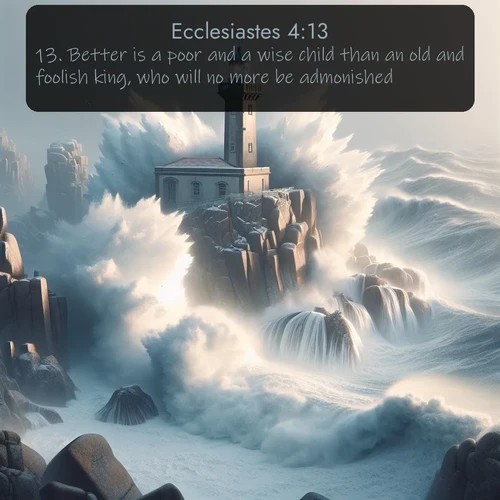Ecclesiastes 4:13 plusieurs versions / traductions
English Bible Translations
13. Better is a poor and a wise child than an old and foolish king, who will no more be admonished.
13. Better is a poor and wise youth than an old and foolish king, who knoweth not how to receive admonition any more.
13. A young man who is poor and wise is better than a king who is old and foolish and will not be guided by the wisdom of others.
13. Better is a poor but wise youth than an old and foolish king, who knoweth no more how to be admonished.
13. Better is a poor and a wise child, than an old and foolish king, who will no more be admonished.
13. Better is a poor and wise youth than an old and foolish king, who hath not known to be warned any more.
German Bible Translations
13. Ein armes Kind, das weise ist, ist besser denn ein alter König, der ein Narr ist und weiß nicht sich zu hüten.
13. Ein armer, aber gescheiter Jüngling ist besser, als ein alter, närrischer König, der sich nicht mehr beraten läßt.
French Bible Translations
13. Mieux vaut être un enfant pauvre et sage qu'un roi vieux et stupide qui ne sait plus se laisser avertir.
13. Mieux vaut un enfant pauvre et sage qu’un roi vieux et insensé qui ne sait plus écouter les avis;
13. Mieux vaut un enfant pauvre et sage qu'un roi vieux et insensé qui ne sait plus écouter les avis;
13. Mieux vaut un jeune garçon pauvre et sage, qu'un roi vieux et sot qui ne sait plus être averti.
13. Un enfant pauvre et sage vaut mieux qu'un Roi vieux et insensé, qui ne sait ce que c'est que d'être averti.
13. Mieux vaut un enfant pauvre et sage qu'un roi vieux et insensé, qui ne sait pas recevoir de conseil.
Versions with Strong Codes
Ecclesiastes 4 / KJV_Strong13.
Strong Code definitions
H2896 towb tobe from H2895; good (as an adjective) in the widest sense; used likewise as a noun, both in the masculine and the feminine, the singular and the plural (good, a good or good thing, agood man or woman; the good, goods or good things, good men or women), also as an adverb (well):--beautiful, best, better, bountiful, cheerful, at ease, X fair (word), (be in) favour,fine, glad, good (deed, -lier, -liest, -ly, -ness, -s), graciously, joyful, kindly, kindness, liketh (best), loving, merry, X most, pleasant, + pleaseth, pleasure, precious, prosperity, ready, sweet, wealth, welfare, (be) well((-favoured)). see H2895
H4542 micken mis-kane' from H5531; indigent:--poor (man). see H5531
H2450 chakam khaw-kawm' from H2449; wise, (i.e. intelligent, skilful orartful):--cunning (man), subtil, ((un-)), wise((hearted), man).see H2449
H3206 yeled yeh'-led from H3205; something born, i.e. a lad or offspring:--boy, child, fruit, son, young man (one).see H3205
H2205 zaqen zaw-kane' from H2204; old:--aged, ancient (man), elder(-est), old (man, men and...women), senator.see H2204
H3684 kciyl kes-eel' from H3688; properly, fat, i.e. (figuratively) stupid or silly:--fool(-ish).see H3688
H4480 min min or minniy {min-nee'}; or minney (constructive plural){min-nay'}; (Isaiah 30:11); for H4482; properly, a part of; hence (prepositionally), from or out of in many senses (as follows):--above, after, among, at, because of, by (reason of), from (among), in, X neither, X nor, (out) of, over, since, X then, through, X whether, with.see H4482
H4428 melek meh'-lek from H4427; a king:--king, royal. see H4427
H834 'aher ash-er' a primitive relative pronoun (of every gender and number); who, which, what, that; also (as an adverb and a conjunction) when, where, how, because, in order that, etc.:--X after, X alike, as (soon as), because, X every, for, + forasmuch, + from whence, + how(-soever), X if, (so) that ((thing) which, wherein), X though, + until, + whatsoever, when, where(+ -as, -in, -of, -on, -soever, -with), which, whilst, + whither(- soever), who(-m, -soever, -se). As it isindeclinable, it is often accompanied by the personal pronoun expletively, used to show the connection.
H3045 yada` yaw-dah' a primitive root; to know (properly, to ascertain by seeing); used in a great variety of senses, figuratively, literally, euphemistically and inferentially (including observation, care, recognition; and causatively, instruction, designation,punishment, etc.) (as follow):--acknowledge, acquaintance(-ted with), advise, answer, appoint, assuredly, be aware,(un-)awares, can(-not), certainly, comprehend, consider, X could they, cunning, declare, be diligent, (can, cause to) discern, discover, endued with, familiar friend, famous, feel, can have, be (ig-)norant, instruct, kinsfolk, kinsman, (causeto let, make) know, (come to give, have, take) knowledge, have (knowledge), (be, make, make to be, make self) known, + be learned, + lie by man, mark, perceive, privy to, X prognosticator, regard, have respect, skilful, shew, can (man of) skill, be sure, of a surety, teach, (can) tell,understand, have (understanding), X will be, wist, wit, wot.
H3808 lo' lo or lowi {lo}; or loh (Deut. 3:11) {lo}; a primitive particle; not (the simple or abs. negation); by implication, no; often used with other particles (as follows):--X before, + or else, ere, + except, ig(-norant), much, less, nay, neither, never, no((-ne), -r, (-thing)), (X as though...,(can-), for) not (out of), of nought, otherwise, out of, + surely, + as truly as, + of a truth, + verily, for want, + whether, without.
H5750 `owd ode or rod {ode}; from H5749; properly, iteration or continuance; used only adverbially (with or without preposition), again, repeatedly, still, more:--again, X all life long, at all, besides, but, else, further(-more), henceforth, (any) longer, (any) more(-over), X once, since, (be) still, when, (good, the) while (having being), (as, because, whether, while) yet (within).see H5749
H2094 zahar zaw-har' a primitive root; to gleam; figuratively, to enlighten (by caution):--admonish, shine, teach, (give) warn(-ing).
Prédications qui analysent les thèmes Ecclésiaste 4
Thèmes : Inutilité des efforts ; Solitude de l'homme ; Valeur de l'amitiéRelated Sermons discussing Ecclesiastes 4
Themes : Inutilité des efforts ; Solitude de l'homme ; Valeur de l'amitiésee also: Bible Key Verses ; KJV Bible Images, BBE Bible images

